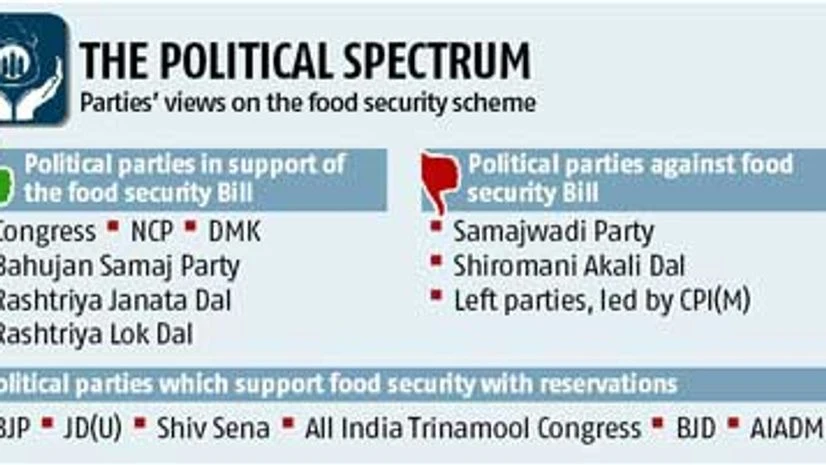Unwilling to leave it to the vagaries of political parties, the Congress-led United Progressive Alliance (UPA) on Wednesday cleared the decks for bringing in the contentious food security Bill through the ordinance route. The Bharatiya Janata Party (BJP), the Samjawadi Party (SP), the Janata Dal (United), and Akali Dal have vociferously opposed the government's decision to bring such a crucial Bill through an Ordinance.
Soon after the UPA moved to bring in the ordinance, the BJP said that while the party supports the Bill, it wanted a debate on the issue in Parliament.
Even the SP, which renders outside support to the government, has vehemently attacked it. Senior SP leader Naresh Agarwal said: "This is a slap-dash move and only goes to prove that the government is heading for mid-term polls." Sticking to its earlier stand, the SP leader said the Bill was inherently "anti-farmer". "The day the Bill is implemented, farmers will stop getting proper dues for their produce." (JOURNEY TO FOOD SECURITY)
Significantly, agriculture minister and Nationalist Congress Party chief Sharad Pawar, who was in favour of the Bill but wanted a debate in Parliament, now supports the government's decision. Senior NCP leader D P Tripathi said, "We had certain concerns and we wanted farmers' rights to be protected. We are part of the government and so obviously support it."
The BJP, however, believes that the food security ordinance is an attempt by the UPA for "electoral security" in the Lok Sabha elections in 2014. Rejecting the ordinance cleared by the government, senior BJP leaders accused the government of running away from a discussion in Parliament.

Similar concerns were raised by former NDA partner Janata Dal (United), which asked why the government was in a such a hurry and why it did not wait for the monsoon session, which is expected to start later in July.
"The government could have called for a special session or waited for monsoon session. There is no clarity what will be the burden on the state government and what percentage of people will benefit from food security. We have been raising our concerns but the government has not answered and now an ordinance has been cleared," said S N Tiwari, senior leader of JD(U).
Former UPA ally Trinamool Congress, too, is not keen on the ordinance route. Sudip Bandyopadhyay, the leader of the party in the Lok Sabha, said: "We have never preferred the ordinance route, especially now when the monsoon session is round the corner. They should have tabled the Bill on the floor of Parliament." (Comments on Food Bill Ordinance)
The Left parties who had been agitating for long for universalisation of the food security scheme through the public distribution system is not in support of the UPA's food Bill.
In a statement on Wednesday, the CPI(M) stated: "The Politbureau strongly objects to these new provisions, which will reduce the entire Bill into a platform to push through neo-liberal reforms with legal sanction, which are against the interests of the people and which will lead to further exclusions."
The Bill must include the universal right to at least 35 kg of foodgrains at Rs 2 a kg. The CPI(M) was also of the view that it was a "blatant violation of federal norms".
D Raja, national secretary of the CPI, too, opposed the move, saying the government should have "advanced the monsoon session of Parliament, if it was keen and honest to get the Food Security Bill passed".
Holding that the current legislation was "not acceptable", he said the measure needed to be "drastically amended" and "thoroughly debated".
FINDINGS OF CRISIL STUDY
- The food security Bill entitles 75% of rural and 50% of urban population to subsidised foodgrains
- People below poverty line (BPL) to spend less on foodgrains and more on health and education
- More BPL people are expected to shift to public distribution system (PDS) once the food Bill is effectively implemented
- As per the Tendulkar committee report, 41% of rural and 25% of urban population are below poverty line
- On an average, each BPL household will save Rs 4,440 this year
- The savings would be twice the amount of a household spends on health and education and a little less than the amount spent on protein and household consumables
- Demand for fish, eggs, milk and toiletries expected to rise
- Urban poor is expected to spend more on conveyance, rent and clothes
- Although the food Bill covers 67% of the population, it doesn't provide means to identify households
- Food security Bill can be more effective, if foodgrains are purchased from authorised food outlets outside the existing PDS network
Source: CRISIL

)
